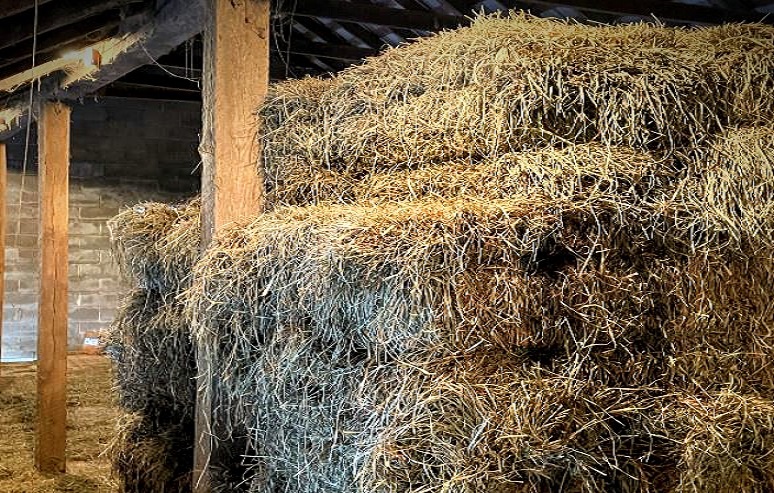Will Your Feed Last the Winter?

People getting close to retirement worry about their savings. But if you’re a farmer, you run into the same kind of worry every winter. You were content in the fall with the hay in your barn. But, as the winter starts to wind down, and we are starting to hope for spring, there is a nagging thought in the back of the mind of every farmer. Is the hay in my loft or barn, or the feed in my bins enough? The fields are not ready to feed the cattle, horse, sheep or goats, at least not yet. And NO ONE wants to buy hay at the end of winter.
So, do you have enough? If you keep track, you should be able to calculate the feed rate of your herd over time. You sum up the amount of feed (e.g. 18 round bales) over a period of time (e.g. 8 weeks), and the math is fairly simple.
Bales per Week = (18 bales)/(8 weeks) = 2.25 or 2 ¼ bales per week.
Now, you know you have 27 bales still in the barn, and at 2.25 bales per week, that turns into 12 weeks of hay.
Remaining Weeks = 27 bales / (2.25 bales/week) = 12 weeks.
If you haven’t kept a running tally of your feed numbers, you need to make some rough calculations that will depend on several factors:
- How many animals do you have?
- How much feed per day is recommended for that kind of animal?
Answering the second question, isn’t straight forward either. The amount of feed for your animal can be affected by their species, breed, size, activity level and even their own metabolism. For example, the famous racehorse Sea Biscuit was small, generally lazy, but would eat twice what other horses ate. That’s metabolism!
Our family boards horses, and here are some calculators for the equine community to answer the feed questions. They may be useful for other animals too.
- Weight of Horse: This is based on the girth and length of the horse.
- Daily Hay Weight for a Horse: This is based on the horse's weight and percent of body weight.
- Daily Bales of Hay for a Horse: This is based on the horse's weight, percent of body weight and weight of bales.
- How Long Hay will Last: This is based on the number of bales in the loft, number of horses, and the bales per day for the horses.
In general terms, you are dealing with the math associated with Production and Consumption. vCalc has a library of functions in this category, but here are some Production and Consumption Calculators that might help are:
- Time to Consume a Specified Volume base on Rate of Consumption
- Total Volume Consumed over Time based on Flow Rate
- Total Volume Consumed over Time based on Volume Rate
- Price per Volume
- Price Compare by Volume
- Total Weight Consumed over Time based Weight Rate
- Price per Weight
- Price Compare per Weight
If these help you, great. If there are corrections, suggestions or requests for other calculators, please let us know by clicking on the “Not finding what you’re looking for? Let us help” bar on top of any vCalc page. We will get back with you quickly.
- Comments
- Attachments
No comments |
